Chairman’s Report for August 11, 2017
In this issue of the newsletter
New: Report from Qaraqosh: Families receive food, hygiene supplies and diapers
New: Report from Dohuk, Iraq: Meeting with Assyrian leaders / Aid for Camp Odrana
New: Report from Jordan: Security updates at Christian summer camp complete
New: Children from traditional Christian families find personal relationship with Jesus
Report from Iraq: Qaraqosh and Bartella
A Summary: In the last Chairman’s Report dated July 14th I detailed the first few days of my inspection mission to Iraq. At four locations, diapers were delivered to young Christian mothers displaced from the Nineveh Plain. These distributions occurred at the Ozal, Kanjan, Ashti2 and Rock Compounds. The largest distribution assisted 320 families at the Ashti2 location. In addition to the diapers, every mother received feminine sanitary pads. (If you did not receive the July 14th addition of the Chairman’s Report, it is available here. Videos are also available there).
The Qaraqosh Distribution: I only briefly mentioned the distribution of food and hygiene supplies in Qaraqosh, Iraq in the previous Chairman’s Report. This once thriving, majority Christian town still lies in ruins. Two-thirds of the homes are still not fit for habitation. In Qaraqosh and other towns that were overrun and occupied by Islamic State (ISIS), all of the Christian homes were looted before they were blown up or burned. Every usable item in the homes was stolen and transported to Turkey to be sold on the black market. By everything, I mean everything — including clothing, furniture, stoves, refrigerators, dishes and even the eating utensils in the kitchen. Unless an item was broken and useless, it was stolen.

One of our volunteers helps two ladies with their hygiene and food packages at Qaraqosh distribution.
Muslim homes, including the few that there were in Qaraqosh, were untouched.
In June, I personally led a truck convoy that delivered supplies to the two hundred families who have returned to Qaraqosh to live. The village, liberated from the Islamic State in December of 2016, was home to at least 12,000 Christian families before its capture in 2014. Doing the math, it is obvious that not even one percent of the families have returned to stay.
The living is very difficult for those who have returned. Only generator power is available, and summer temperatures are often over 100 degrees. The water supply is not safe, and only a handful of businesses have reopened.
At one point this year as many as 350 families tried to move back, but because of the horrid living conditions many gave up and left. In June, there were about 200 families there still trying to rebuild.
It is important to understand that Qaraqosh was a vibrant middle to upper income class town, not a third world village of huts. Every home was air conditioned and some had swimming pools. Most of the residents were employed in white collar jobs or ran their own businesses.

One of the large middle-class homes destroyed by the Islamic State in Qaraqosh. Of course, most residents lived in smaller homes or apartments.
The view held by many Americans that the Iraqi people are ignorant and live in tents with camels is just not true. Before the first Gulf War in 1991, the literacy rate in Iraq was near 100%. After many years of war and the displacement of millions of citizens, the literacy rate has dropped to 84%. However, among Christian families, the literacy rate has remained near the 100% level.
After the second Gulf War in 2003 there were 2,751 schools which were damaged severely and 2,400 schools which experienced looting. That was before the Islamic State took control of over half of Iraq and forbade any education for girls.
Rebuilding the economy of a town such as Qaraqosh is not just about supplying food, but about rebuilding schools and commerce. The Religious Freedom Coalition had offered to refurbish one school in Qaraqosh; however, another NGO took on the project. I have for some time wanted the Religious Freedom Coalition to assist in the rehabilitation of Qaraqosh. Recently though, Franklin Graham’s Samaritan Purse announced the construction of a headquarters building in Qaraqosh, and because
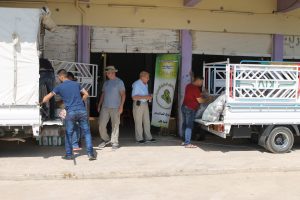
Two trucks were required to bring the hygiene packages, food packages and diapers. The concept was for families to enter the building to register and then pick up supplies as they left.
of the size of that organization, our plans are on hold until the scope of Graham’s programs there are revealed.
Samaritan’s Purse is not in Qaraqosh as yet and the supplies we delivered to the 200 families who have returned were needed. Two packages were given to each family. One contained foods such as canned meat, beans and other staples along with a 4.3 kilo bag of rice.
The second package contained hygiene materials for both personal and household use. The hygiene packages contained personal soaps, shampoo, toothpaste, toothbrushes and other personal items plus disinfectants, household cleaners and detergents.
Our distribution in Qaraqosh was organized by a veterinarian who had lived there before the town was seized by the Islamic State. His practice included farm animals in nearby areas, and the pets of those who lived in the town. Prior to our arrival he had made a list of every family who had returned, and the specific needs of those families. For example, in some cases parents had returned with married adult children, in which case they received double rations. We also distributed diapers to a surprising number of the 200 families. Adult diapers were made available to those with special needs. The Religious Freedom Coalition will continue to work in Qaraqosh, being careful not to duplicate the work of other NGO’s who are now entering the area as the Islamic State is pushed back.
Last stop in Iraq – Dohuk
Assyrians are an ethnic group – During my June inspection tour and mission trip to Iraq, I visited Dohuk, a larger city which is north of the Nineveh Plain. As the Islamic State (ISIS) advanced in 2014 and drove Christians from their homes in the Nineveh Plain, many fled to towns in Dohuk Province and into the city of Dohuk itself. About 5,000 displaced Christian families are temporarily housed there. Part of my mission was to determine the feasibility of expanding the Christmas program this year to Dohuk.
Most of the families who fled to this area are Assyrian Christians, because this is part of the Assyrian homeland. Assyrians, though, are an ethnic group — not a specific faith. Some have little or no relationship with the church.
In 721 B.C. the Assyrians captured Samaria and essentially ended the northern kingdom of Israel and carried off the Israelites as slaves. Later the Assyrians laid siege to Jerusalem. These conflicts and outcomes are recorded in Isaiah, Chronicles and II Kings. Assyrians converted to Christianity in the fourth century through evangelism, along with the Armenians.
[su_button url=”http://diapersforrefugees.org/helping-christian-refugees/”]Christian refugee mothers desperately need diapers for their babies – Please help[/su_button]
In the office of an Assyrian leader I met who was a Christian, there was a plaque listing all the kings of Assyria. It is important to understand that the Assyrians are an ethnic group, just like the Kurds, and not only a religious minority.
There were 2 million Assyrians in this area of Iraq before the First Gulf War, yet now they may number less than 200,000. The city of Dohuk, which was 90 percent Christian in 1960, is now 90% Muslim.
My discussions in Dohuk were fruitful and I do believe the Christmas program can be extended to some villages in Dohuk Province this year.
While there, I visited Camp Odrana which is operated by the Assyrian Relief Organization and learned from the camp director of a critical need for water. The forty-four units there are not air conditioned, and up to eight people live in each 12 x 22-foot caravan. Temperatures run over 100 degrees. The units are cooled with water vapor, not air-conditioning units as we understand them in the USA. The camp requires 480,000 liters of water per month — that is 47,550 gallons. Sounds like a lot, but that is for drinking, bathing and cooling. (Odrana means “help” in Arabic.)
The local water system cannot meet the needs of the camp and the water must be trucked in and loaded into an onsite tank. When I was there, all meat purchases had been suspended to buy water. The cost for the water is $1,000 per month. I made the promise to pay the cost of the water for the rest of the year after seeing the conditions and talking with residents. The first monthly transfer of funds was done in July.
Summer Camp for Christian Children
A place in Jordan for Christian children: For more than a decade the Religious Freedom Coalition has supported a camp in Jordan, an important summer destination for Christian children in Jordan. I visitedthere on my way back to the United States from Iraq, to check on the security updates that were funded by the Religious Freedom Coalition.
This summer camp was founded 30 years ago by a close friend of mine, and many who attended as children are now leaders in the Christian community in Jordan. During that time the infrastructure of the camp aged, so updates and repairs were needed. The Religious Freedom Coalition has helped with many of the needed updates and repairs.
The water supply, as an example, was furnished by metal tanks on the tops of buildings. The tanks had rusted through, allowing insects to live inside and lay eggs. We changed the entire water system of the camp to a clean, modern PVC system.
This year some very expensive work was required at the camp because of a visit from the Jordanian secret police. The ministry operating the camp was notified that it could be a terrorist target and that security updates costing tens of thousands of dollars would be needed before children arrived this summer.
Of the repairs, updates and additions required, the Religious Freedom Coalition took on $15,000 of the work. We paid for the required security flood lights that can illuminate the entire camp from fence edge to fence edge. We also funded a state of the art video security system that could be monitored from Amman. The System consisted of 35 video cameras plus a monitoring station.
We also funded fencing repairs that were required, and increased the height of the fence in critical areas.
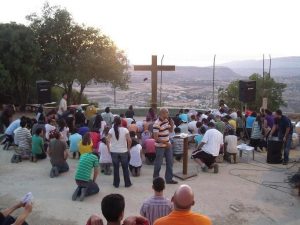
Sunset worship service at Camp Gilead. Fence and barbed wired protect the area. Across the Jordan Valley, Israel can be seen.
Extremists have burned the camp down in the past, but fortunately that occurred in off months when no children were present and the camp was unguarded. The security procedures were needed, but having them required by police so suddenly, just days before the opening of the camp caused many issues including the fact that the ministry operating the camp did not have the funds.
Like other ministries and churches in Jordan, they struggle to minister not only to their local Christian community, but to the many refugee families who have fled to Jordan seeking refuge from Muslim terror in Iraq and Syria. Fortunately, we were able to help.
I have visited the camp numerous times and I am always impressed and uplifted. Each year, over fifty adults, mostly young men and women who are “graduates” of the camp are there to help. There are ample counselors to help the youngsters establish and strengthen their relationships with Jesus. Many of the children and youth who attend are Christian by birth only, and have never had a personal experience of salvation. Camp Gilead is an important part of the Christian experience in Jordan.
Videos of my visit there and of the children can be found at our Internet site at www.ReligiousFreedomCoalition.org.
William J. Murray, Chairman
Religious Freedom Coalition, 601 Pennsylvania Ave. NW #900, Washington, DC 20004 * (202) 742-8990

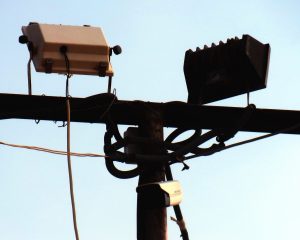
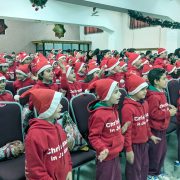
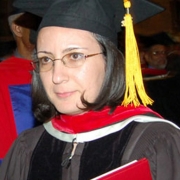
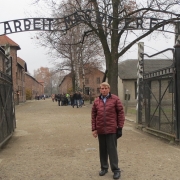
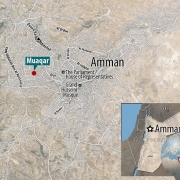
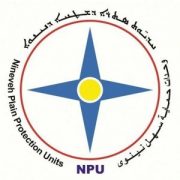
Leave a Reply
Want to join the discussion?Feel free to contribute!